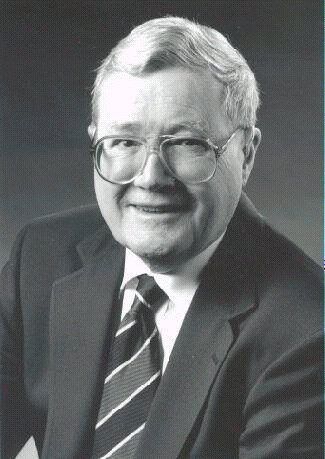Gordon Tullock, RIP

 The great economist Gordon Tullock died recently at age 92. He is most associated with Public Choice Economics. Under it, economists look at government bureaucrats, not as disinterested, omniscient parties trying to keep things going by enforcing the rule of law, but as themselves flawed actors in the political drama. His early theories were written in a 1962 book with James Buchanan (who won the 1986 Nobel economics prize) in “The Calculus of Consent,” free here.
The great economist Gordon Tullock died recently at age 92. He is most associated with Public Choice Economics. Under it, economists look at government bureaucrats, not as disinterested, omniscient parties trying to keep things going by enforcing the rule of law, but as themselves flawed actors in the political drama. His early theories were written in a 1962 book with James Buchanan (who won the 1986 Nobel economics prize) in “The Calculus of Consent,” free here.
The proof of Public Choice Economics has become even more clear since public-employee unions were allowed collective-bargaining powers beginning in the early 1960s. Especially in California, the unions use their political clout to greatly influence elections, putting in place politicians and ballot initiatives that, for example, have goosed pensions to unbearable levels.
John J. Miller wrote of Tullock a couple years back:
The book is a founding text of public-choice theory, a powerful intellectual movement that analyzes why governments so often fail to achieve their goals. “It’s a classic,” says William A. Niskanen, chairman of the Cato Institute. Public-choice theorists view lawmakers and bureaucrats through the lens of classical economics: as rational deliberators acting on the basis of their own interests. By eschewing the naïve view of public officials as selfless benefactors of the public good, this approach has blazed new trails in explaining government dysfunctionality….
But the case for Tullock doesn’t need to rest on this book alone, as his greatest contribution to economics may lie somewhere else entirely.
Tullock is the author of one of the most groundbreaking economics papers ever published: “The Welfare Costs of Tariffs, Monopolies, and Theft.” It explained that when individuals or groups try to gain economic advantages through the manipulation of government policy — lobbying to build trade barriers or legal monopolies, for instance — the costs of their activities are both high and hidden. They not only discourage competition, but also drive talented people into non-productive activities, as skilled managers devote themselves to winning new favors from government or defending the ones they already have. Today, this behavior is called “rent-seeking,” and it is of course deeply embedded in Washington’s [and Sacramento’s — J.S.] political culture of earmarks and subsidies. In his paper, Tullock mischievously likened the whole enterprise to theft. “I try to raise eyebrows in everything I write,” he says.
[The paper] has since been credited with helping overturn the once-consensus view that the social costs of government regulations are minimal.
Instead, as we see here everyday in California especially, the social costs of government are immense, and do such things as driving out businesses and tax-paying workers.
Tullock helped provide us the theoretical framework to understand the ripoffs and oppressions government was imposing in practice.
Related Articles
Punitive Sales and Use Tax Modified
The Board of Equalization (BOE) has an unusual deadline for the payment of Sales and Use taxes by California businesses,
Know Your ‘Rich’ Economic History
Katy Grimes: In order to fully comprehend how California residents will be impacted even more by Democrats in the near future, we
CalWatchdog Morning Read – May 4
CA’s primary once again irrelevant Unions and ride-sharing services near deal? Voters get to decide on legal pot Newsom



